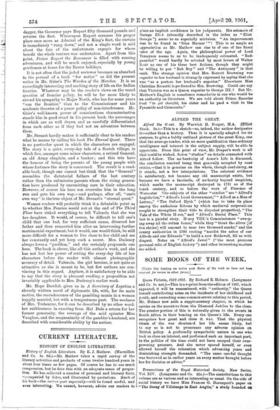ALFRED THE GREAT.
Alfred the G'eat. By Warwick H. Draper, M.A. (Elliot Stock. 584—This is a sketch—so, indeed, the author designates it—rather than a history. Thus it is specially adapted for its purpose, to give a boldly outlined picture of the great King, one that the average reader, with no more qualification than ordinary intelligence and interest in the subject supply, will be able to appreciate. From this point of view, Mr. Draper's work is all that could be wished. Seven ".studies" on details connected with Alfred follow. The aw henticity of Asser's Life is discussed, the conclusion reached being that generally accepted by sane critics,—that it is genuine on the whole, though containing, as it stands, not a few interpolations. The external evidence is satisfactory, not because any old manuscript exists, but because we have a facsimile, of authority beyond suspicion, which marks the manuscript destroyed in 1731 as of the tenth century, and so before the work of Florence of Worcester 'I be subjects of the other " studies " are " Alfred's Legislation," " Alfred's Local Government," " Alfred as a Man of Letters," "The Oxford Myth" (which has to take its place among the audacious fictions by which mediaeval corporations sought to strengthen their title to disputed properties), "The Vale of the White Horse," and " Alfred's Burial Place," This last is a painful story. Henry VIII.'s Commissioners " sweep- ing away all the rotten bones," while they " think the silver [of the shrine] will amount to near two thousand marks," and the county authorities in 1786 routing "amidst the ashes of our Alfreds and our Edwards" to build a new Bridewell, fill us with disgust. Notes on " Alfred's Jewel" (" the moat precious personal relic of English history ") and other interesting matters are added.






































 Previous page
Previous page